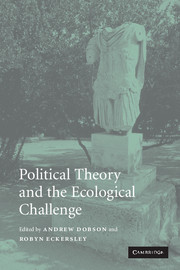14 - Security
Published online by Cambridge University Press: 06 July 2010
Summary
What is the relationship between environment and security? Will environmental change produce violent conflict and thus insecurity? What is the relationship between ‘national security’ and the environment? Over the last thirty years, and particularly the last fifteen years, there has been a lively interest in these and related questions, under the rubric of ‘environmental security’.
Beginning in the 1970s, environmental advocates began proposing redefined ‘security’ to encompass a wide array of threats, ranging from earthquakes to environmental degradation. Others pointed to the destruction of the environment caused by war, and hypothesised that interstate war and other forms of violence would result from resource scarcity and environmental degradation. Yet others proposed to ‘reconceptualise sovereignty’ in order to focus on ‘ecological security’. Most of the pioneering conceptual work on environmental security was done by advocates of greater environmental awareness. Such concepts were advanced in the context of the renewed Cold War tensions in the late 1970s and early 1980s, and were extrapolations from the fears of resource wars in the wake of the oil crises of 1973 and 1979.
By the late 1980s, and early 1990s, ‘environmental security’ was a broad movement, had generated an empirical research agenda and had begun to shape policy. As the Cold War waned, such ideas began to attract the interest and support of military organisations who saw possibilities for new ‘missions’.
- Type
- Chapter
- Information
- Political Theory and the Ecological Challenge , pp. 232 - 252Publisher: Cambridge University PressPrint publication year: 2006
References
- 3
- Cited by



